This is “Oscar Wilde (1854–1900)”, section 7.8 from the book British Literature Through History (v. 0.1). For details on it (including licensing), click here.
For more information on the source of this book, or why it is available for free, please see the project's home page. You can browse or download additional books there. To download a .zip file containing this book to use offline, simply click here.
7.8 Oscar Wilde (1854–1900)
PLEASE NOTE: This book is currently in draft form; material is not final.
Learning Objectives
- Define comedy of manners and apply the definition to The Importance of Being Earnest.
- Analyze the use of characteristics of comedy of manners in The Importance of Being Earnest.
- Appraise The Importance of Being Earnest as a criticism of and satire on Wilde’s contemporary society.
Biography
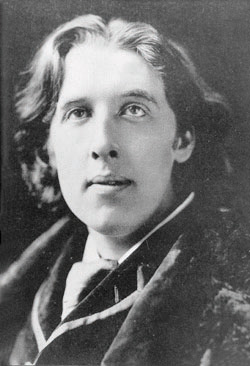
Oscar Wilde was born in Dublin, Ireland, moved to England to attend Oxford University, and then moved to London. Wilde had been rejected by his first love, but in London met and married Constance Lloyd, with whom he had two children.
Wilde is considered one of the founders of the aesthetic movementThe theory of “art for art’s sake” that places the pursuit of beauty as the highest purpose of art., the theory of “art for art’s sake” that places the pursuit of beauty as the highest purpose of art. Aestheticism, with its ideals of beauty and the belief that art and morality are not connected, spread throughout Europe in the late 19th century. The aesthetic philosophy contrasted with the Victorian ideals of duty, decorum, and decency represented by Queen Victoria and perceived in the works of Victorian writers such as Browning and Tennyson. In addition to literature, aestheticism influenced visual and decorative arts. From aestheticism grew the concept of the alienated artist, divorced from mainstream society, isolated from a middle class who cannot understand his/her work, an individual of more sensitive perception, more refined sensibilities than the ordinary person.
Wilde wrote children’s books, the novel The Picture of Dorian Gray, and, most famously, a series of satirical plays, the last and most well known The Importance of Being Earnest.
In the 1890s, Wilde’s scandalous court trials all but overshadowed his literary accomplishments. When the Marquis of Queensberry accused Wilde of homosexuality, Wilde sued him for libel. During the trial, witnesses testified that Wilde was guilty of homosexual activity, and even though Wilde dropped his suit against the Marquis, the government issued a warrant for Wilde’s arrest on charges of homosexual activity. Found guilty and sentenced to two years in prison, Wilde suffered declining health throughout his imprisonment. After his release, he moved to France and died there in 1900.
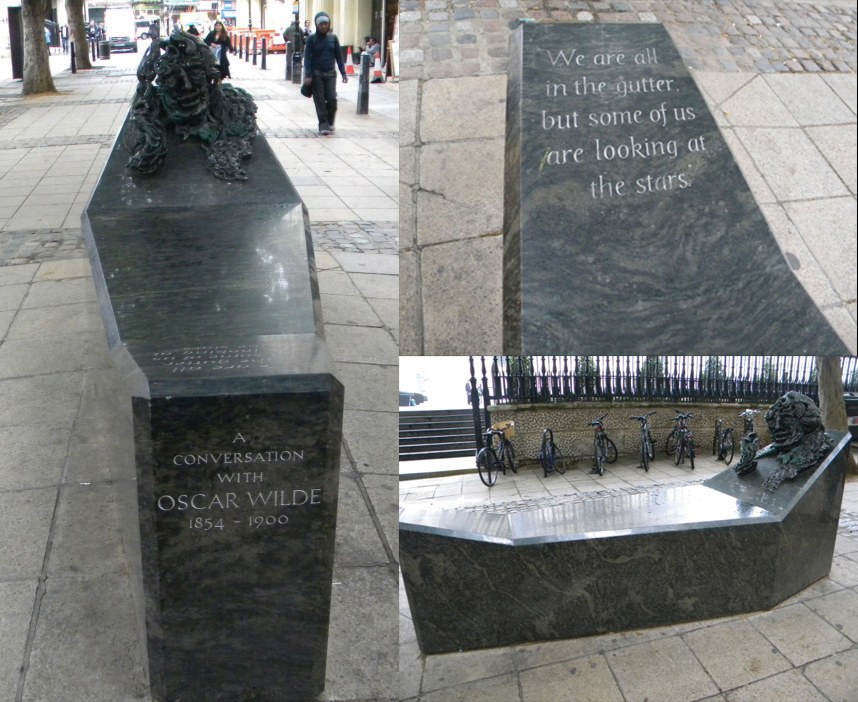
A contemporary bench commemorating Oscar Wilde near St. Martin’s in the Field, London.
Text
- The Importance of Being Earnest. CELT: Corpus of Electronic Texts. University College Cork, Ireland.
- The Importance of Being Earnest. Project Gutenberg.
- The Importance of Being Earnest: A Trivial Comedy for Serious People. London: Methuen & Co., 1919. Hathi Trust Digital Library.
Comedy of Manners
First produced in 1895, Wilde’s play The Importance of Being Earnest abounds in witticisms and sly criticism of late Victorian society.
The Importance of Being Earnest is a comedy of manners, a type of play popularized in the late 17th and 18th centuries. A comedy of mannersA witty, satirical play which mocks aristocratic society. is a witty, satirical play which mocks aristocratic society. Wilde revived the comedy of manners, which had its zenith in the Restoration comedies of Sheridan and Goldsmith, to write an immensely popular, funny criticism of Victorian aristocracy. In the play, Wilde attacks Victorian complacency, as did Tennyson, but in a very different manner. Wilde displays the foibles of society for ridicule and for his audience’s amusement.
Albert Edward, the future King Edward VII, was the eldest son of Queen Victoria and Prince Albert. Although he was heir to the throne, his mother did not entrust him with royal duties or make any attempts to prepare him for his future role as king. Instead, the Prince of Wales (known as Bertie to his family and friends) became the most prominent member of a group of highly elite socialites, the Marlborough House Set, named for the house Albert Edward occupied with his wife and family. Even after he married Princess Alexandra of Denmark (an arranged marriage), Bertie was notorious for his extravagant lifestyle and his string of mistresses, ranging from actresses to the wives of other noblemen, one of whom was at his bedside when he died. He fathered a number of illegitimate children, some of them passed off as the children of their mothers’ husbands.
Bertie’s crowd of affluent individuals did not work for a living (their families being independently wealthy), spent their lives in pursuit of pleasure, and gathered at their country estates for long weekends of hunting, card playing, and flirting. All members of this group would, like Wilde’s character Jack, have homes in the city and in the country.
One of Bertie’s well-known mistresses was Daisy, Countess of Warwick, wife of Francis Greville, Lord Brooke, the Earl of Warwick. Daisy and her husband lived in Warwick Castle, the medieval castle that had for generations been home to the Earls of Warwick. Daisy was one of the most popular hostesses of country weekends at the magnificent Warwick Castle. Warwick was owned by the same family until 1978 but is now open as a tourist attraction. One of the exhibits at Warwick Castle is called “A Royal Weekend Party” and depicts Albert Edward (Bertie) the Prince of Wales, Daisy Countess of Warwick, and others of the Marlborough House Set.
In The Importance of Being Earnest, Wilde writes satirically about these people, the aristocracy of late Victorian England.
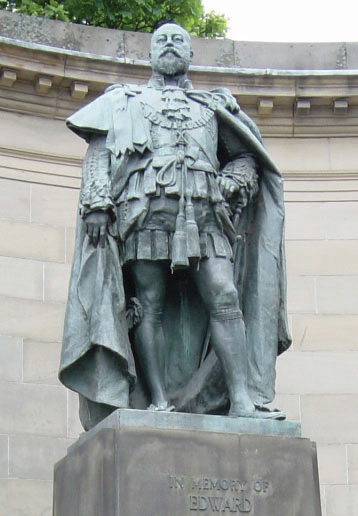
A statue of Edward VII at Holy Rood Palace in Edinburgh, Scotland.

Warwick castle.
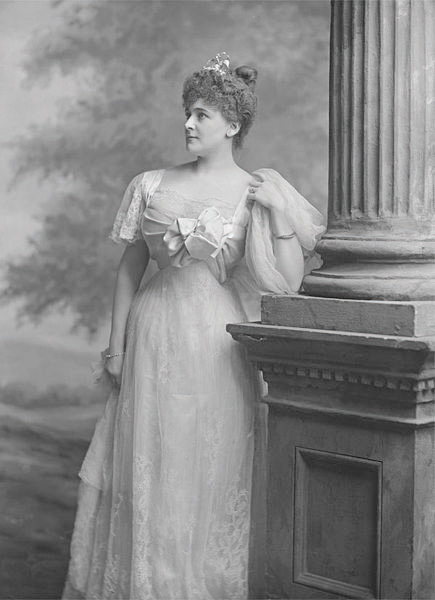
Daisy, Countess of Warwick.
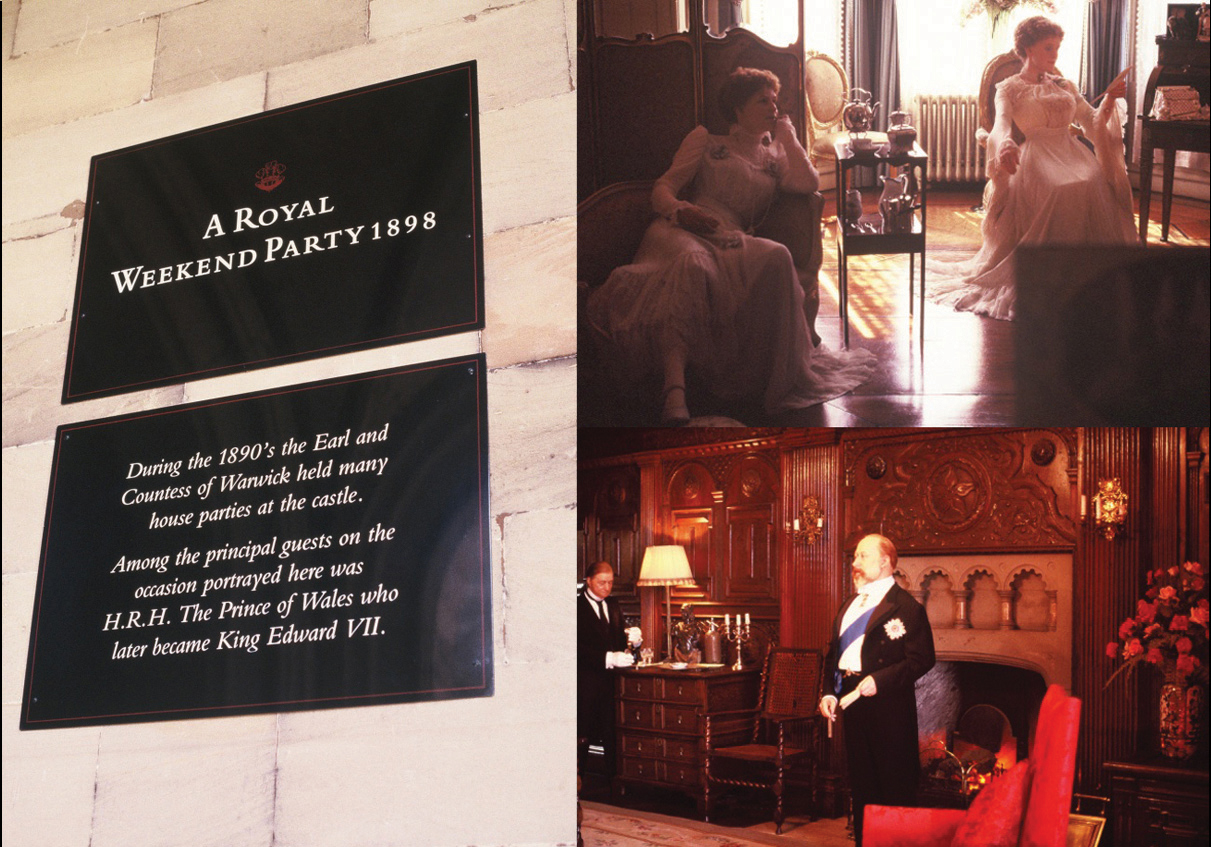
Characteristics of Comedy of Manners
- Realistic. In The Importance of Being Earnest, Wilde presents aristocratic characters, members of highest Victorian society, people such as the Prince of Wales and his circle. While Jack, Algernon, Lady Bracknell, and Gwendolen may be exaggerated, the Victorians would have recognized their similarity to a real group of people.
- Satiric.SatireA literary manner, used in any genre (in this case in drama), that blends criticism of a person, event, or situation with witty humor for the purpose of improving the object of the satire. is a literary manner, used in any genre (in this case in drama), that blends criticism of a person, event, or situation with witty humor for the purpose of improving the object of the satire. Satire is mocking but always with a serious underlying purpose; the goal is to use humor to make the audience aware of a situation that needs improvement. In this case, Wilde satirizes the British aristocracy. He also makes fun of numerous facets of Victorian life—note the comments on everything from the British education system to marriage to Darwinism (Darwin’s theories suggest that humans, like animals, behave according to instinct; Cecily comments twice on her “instinctive” knowledge).
- Focus on a dissipated and superficial society. The primary target of satire is the twisted values of the characters. The title of the play is, in itself, a pun on the word “earnest,” meaning honest. The characters are anything but earnest. They value appearance above all else. Note Lady Bracknell’s criteria for a potential husband for her daughter. The young ladies themselves have only one criterion for a future husband: his name must be Ernest. It doesn’t matter if he is a man of character, honesty, worthiness; he just has to have the right name. If any word characterizes Queen Victoria and her age, it is the word earnest; Wilde divulges the insincerity underlying much apparent Victorian earnestness.
- Use of stock characters. Stock characters are stereotypes that appear in all comedies of manners. All comedies of manners will have an ingénue (Cecily in this play); they all will have a dandy (a young man concerned with fashion and fun—Jack and Algernon), they will have an authoritative matron (Lady Bracknell in this case).
- Dominance of dialogue over plot. There is little action; the dialogue is the important element of the play.
- Presence of intrigue in plot. In a comedy of manners there is a mystery to solve: in this play, Jack’s identity.
- Amoral characters. As might be expected within the aesthetic movement, characters display a distinct lack of perception of moral values. Algernon, for instance, lies as easily about cucumber sandwiches as about his financial situation or his potential fiancée. Equally, he expects his servant to lie for him (a jab at the Victorian idea that the upper classes had a duty to set a moral example for those of lower classes). He creates an elaborate fiction (Bunbury) to use as an excuse for anything he doesn’t want to do. Even Jack comments that the truth is not the sort of thing one tells a nice, young girl.
Key Takeaways
- The Importance of Being Earnest is a comedy of manners that exemplifies key characteristics of the form.
- Victorian audiences recognized the satire of the aristocracy and of Victorian “earnestness” in the play.
Exercises
- Consider the title of the play. What is the meaning of the title? Why is the title ironic? To whom does the title apply?
- Make a list of the objects of satire in this play. For example, Victorian education is satirized when Lady Bracknell comments, “Fortunately in England at any rate education produces no effect whatsoever.”
- What is Bunburying? What is its purpose?
- Of the two young ladies Cecily and Gwendolen, does either seem more sincere, more “earnest” than the other? In what ways are they different? In what ways are they the same?
- How does the play represent the relationship between the classes in Victorian society? Do you think this portrayal is realistic?
-
How is marriage depicted? Although not as prevalent or as overt as in the Middle Ages, marriages were, in a sense, still arranged among the upper classes in Victorian England. Albert Edward, the Prince of Wales, for example, had to marry an appropriate young woman from European royalty even though the two didn’t know each other. Aristocratic young people in Victorian England usually married for the sake of family connection, maintenance of wealth, and the unifying of estates or businesses although those involved had the appearance of making their own choices. Even in the mid-20th century, the late Princess Margaret, younger sister of the current Queen Elizabeth II, was unable to marry the man with whom she fell in love because he was divorced and therefore deemed unsuitable. Although Princess Margaret ostensibly made her own decision not to marry him, she was pressured by her sister the Queen and the government to make a more appropriate choice of husband. Even in the 1980s, Lady Diana Spenser married Charles, Prince of Wales after meeting him only 13 times and was considered an appropriate choice of bride because of her family’s lineage and her own innocent past.
How does society’s expectation of “appropriate” marriages influence the treatment of marriage in the play?
- What role do diaries, notes, letters, manuscripts play in the plot? How does written communication compare with spoken communication?
- By the end of the play, who, if anyone, deserves the name Ernest?
- The play is subtitled “A Trivial Comedy for Serious People.” What is the significance of the subtitle?
Resources
General Information
- “The Important of Being Earnest”: The First Stage Production, 1895. Victoria and Albert Museum.
- “A Reader’s Guide to The Importance of Being Earnest.” Dr. Stephanie Forward. The Open University, UK.
- “Oscar Wilde.” The Victorian Web. George P. Landow, Brown University..
- The Oscar Wilde Society. includes a biography and images of historic play programs.
- Reading Wilde: Querying Spaces: An Exhibition Commemorating the 100th Anniversary of the Trials of Oscar Wilde. New York University Libraries.
- “The Trials of Oscar Wilde 1895.” Famous World Trials. Prof. Douglas O. Linder. University of Missouri-Kansas City School of Law.
Biography
- “Chronology of Oscar Wilde.” CELT: Corpus of Electronic Texts. University College Cork, Ireland.
- “Oscar Fingal O’Flaherty Wilde (1854–1900).” The Victorian Web. Philip V. Allingham, Lakehead University.
- “Oscar Wilde Chronology.” The Victorian Web. George P. Landow, Brown University..
- “Oscar Wilde.” Literary San Antonio. English Department, San Antonio College. information on Wilde’s speech in San Antonio, Texas.
- “Oscar Wilde: The Spectacle of Criticism.” Dr. Sandra F. Siegel, Cornell University. Arts & Sciences Newsletter. Spring 1996: 17.2. argues that the flamboyant image of Wilde has overshadowed the more realistic view of the writer.
Text
- “The Importance of Being Earnest.” CELT: Corpus of Electronic Texts. University College Cork, Ireland.
- “The Importance of Being Earnest.” Project Gutenberg.
- “The Importance of Being Earnest: A Trivial Comedy for Serious People.” London: Methuen & Co., 1919. Hathi Trust Digital Library.
Audio
- “The Importance of Being Earnest.” Project Gutenberg.
- “The Importance of Being Earnest.” LibriVox.
Concordance
- ISU Play Concordances: The Importance of Being Earnest. Rosanne G. Potter and Joe Struss. Iowa State University.
Images
- “Oscar Wilde.” Great Britons: Images from the National Portrait Gallery, London.
- “Photographs of Oscar Wilde and His Circle at the Clark Library.” William Andrews Clark Memorial Library. University of California Los Angeles.




